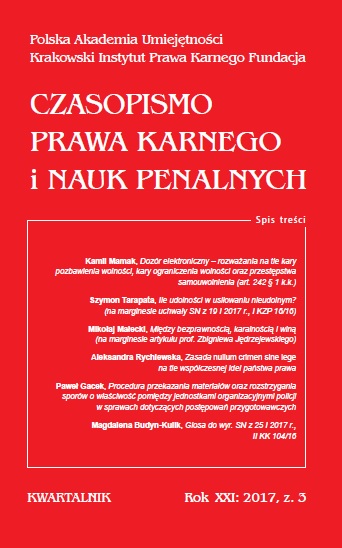Zasada nullum crimen sine lege na tle współczesnej idei państwa prawa
Nullum crimen sine lege principle on the background of contemporary concept of the rule of law
Author(s): Aleksandra RychlewskaSubject(s): Criminal Law
Published by: Polska Akademia Umiejętności / Krakowski Instytut Prawa Karnego Fundacja
Keywords: principle of nullum crimen sine lege; the rule of law; substantive conception of the rule of law; principle of nullum crimen sine periculo sociali; criminal law theory
Summary/Abstract: Zasada nullum crimen sine lege postrzegana jest jako ograniczenie władzy karzącej państwa poprzez wprowadzenie ustawowego katalogu czynów karalnych (i możliwych do wymierzenia za nie sankcji). Ideą jest tu zatem związanie organów wymiaru sprawiedliwości przepisami prawa, w związku z czym stanowi ona wyraz szerszej koncepcji praworządności. O ile w początkowej fazie rozwoju idei państwa prawnego to właśnie ustawa uznawana była za gwaranta praw i wolności obywatelskich, obecnie, kiedy systemy prawne otwierają się na inne wartości, zwłaszcza moralność i sprawiedliwość, zadanie to przypisuje się raczej sędziemu. Odejście od ścisłej ustawowości da się zauważyć także w prawie karnym. Nieostre znamiona pozwalają dopasować treść przepisu do zmieniających się warunków społeczno-ekonomicznych, co sprzyja ochronie konstytucyjnych dóbr prawnych i społecznemu poczuciu sprawiedliwości. Granica między czynami karalnymi i niekaralnymi ulega jednak rozmyciu, stwarzając stan niepewności jednostki co do rzeczywistego zakresu kryminalizacji. Materialny aspekt przestępstwa, wyrażający się w zasadzie nullum crimen sine periculo sociali, zdaje się przeto dominować. The principle of nullum crimen sine lege, stating that only the law can prescribe a punishable act, was established in the Enlightenment as a counteract to the arbitrary use of criminal sanctions. As the idea was to limit the state authority with the written law, the principle emerges as a part of a more general idea of the rule of law. While strict adherence to the words of a legal act was deemed in that time to secure the sphere of rights and freedoms of an individual, nowadays, when the legal system is “opening” to other values, especially morality and justice, it is the judiciary that is said to guarantee the individuals’ freedoms. Such a change of perspective can be also seen in criminal law. Vague terms used by the legislator make the criminal provisions applicable to a variety of circumstances and, consequently, serve as a better protection of legal interests and are reinforcing a social sense of justice. However, the boundary between punishable and unpunishable acts is fading, so an individual cannot be certain of the real extent of criminalization. It can be claimed therefore that the material aspect of an offense, the principle of nullum crimen sine periculo sociali, is dominant.
Journal: Czasopismo Prawa Karnego i Nauk Penalnych
- Issue Year: 21/2017
- Issue No: 3
- Page Range: 95-136
- Page Count: 42
- Language: Polish

